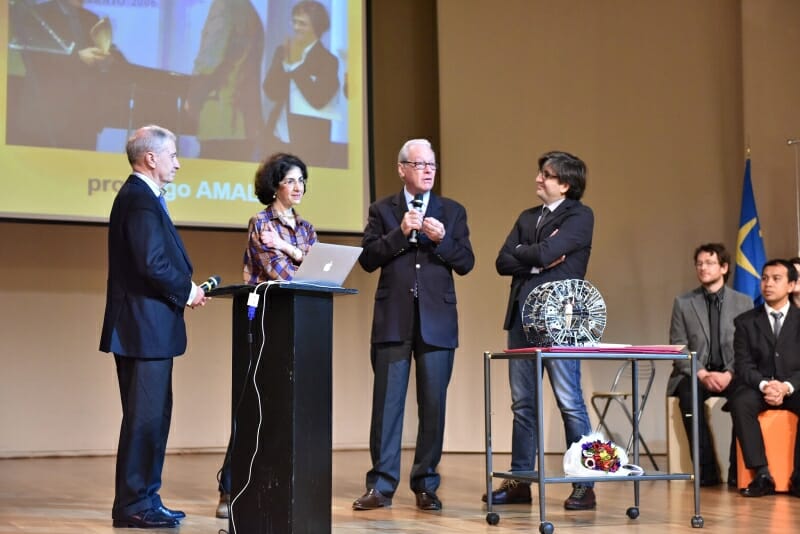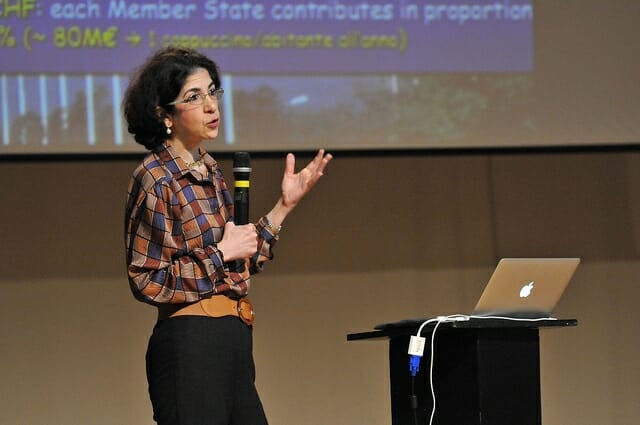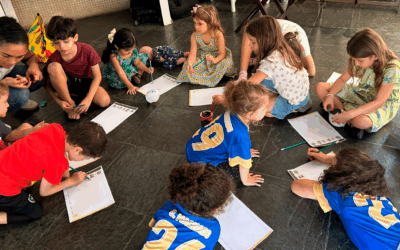 The infinitely small and infinitely big that interact to explain the universe, the application of discoveries such as the Higgs boson, in the medical, technological and social fields. Fabiola Gianotti, the next director of the CERN (European Nuclear Research Centre.) of Geneva, spoke about this on 15 February in Loppiano, before an audience of 800 people among which were scientists, enthusiasts of the scientific world, artists, friends, families and about 200 secondary school students.
The infinitely small and infinitely big that interact to explain the universe, the application of discoveries such as the Higgs boson, in the medical, technological and social fields. Fabiola Gianotti, the next director of the CERN (European Nuclear Research Centre.) of Geneva, spoke about this on 15 February in Loppiano, before an audience of 800 people among which were scientists, enthusiasts of the scientific world, artists, friends, families and about 200 secondary school students.
In short, it seems that science has once again become fashionable in 2015, year in which people are still beset by the economic crisis, but are likewise in search of “infinite spaces that re-focus on what we are, our dignity, and mission in life,» one of those in the audience said. The merit certainly goes to scientists like Gianotti, but also to events like the awarding of the Prize, “Renata Borlone, woman of dialogue.” It was an event of great educational values, where faith and culture intertwined to bring about moments of personal and social growth.
Dr. Giannotti received innumerable messages of congratulations, among which was that from Maria Voce: «The Renata Borlone Cultural Association and Sophia University Institute (IUS) join in the general acclaim, underlining in a particular way, the values that inspire Dr. Giannotti’s life as a woman and scientist.» The Focolare President stressed “the kinship of ideals and objectives of these two figures” (Gianotti and Borlone), though in diverse fields.
«The Higgs boson is considered as the site that gives rise to all the mass of particles in the universe – affirmed Lida Ciccarelli, postulator of the cause for the beatification of Renata Borlone – Renata too was fascinated, not only by science but by all that regards humanity, and had found that site, that field which had given meaning to her life and her daily existence: God. And just as the scientist moves to lift the veil of mystery surrounding the world of science – she continued – she had found in God the revelation of the “other” who asks for love, acceptance, comprehension, and sharing of joys and sufferings, with a human heart. She lived in this divine space and those whom she encountered found a renewed dignity in discovering that they are sons of God.»
 The Prize’s third edition was intended for scientific research enthusiasts and targets to also promote dialogue with those in the academic field who commit themselves to promoting a culture that respects the dignity of the human person. The reason for the conferment of the prize to Fabiola Gianotti, was read by IUS Prof. Sergio Rondinara: “For her elevated professional qualities, her passion in scientific research and her human capacity in guiding a great number of scientists and researchers involved in the CERN’s ATLAS experiment.”
The Prize’s third edition was intended for scientific research enthusiasts and targets to also promote dialogue with those in the academic field who commit themselves to promoting a culture that respects the dignity of the human person. The reason for the conferment of the prize to Fabiola Gianotti, was read by IUS Prof. Sergio Rondinara: “For her elevated professional qualities, her passion in scientific research and her human capacity in guiding a great number of scientists and researchers involved in the CERN’s ATLAS experiment.”
The prize statue is a work of the Chinese artist, Hung, and represents a miniature of a particle accelerator.
Dr. Giannotti’s speech was an intense and passionate exposition that captivated the audience’s attention, and she conducted them on a virtual tour of the universe of infinitely tiny, elementary particles and especially the Higgs boson, discovered at the end of 2012 thanks to the constant work of 3,000 scientists of 38 countries and the technology of the particle collider LHC (Large Hadron Collider), 27 km long, laid out at 100 meters under the ground between Switzerland and France.
«Some of you may wonder: what is so important about these particles? – the scientist said – in reality this question is intrinsically related to our lives, since if the particles did not have the masses they possess, we would not exist. If the electron did not have a mass, the atoms would not bond together and, therefore, chemistry would not exist and there would be no matter, the way we know it. So we exist also thanks to this Higgs mechanism.»
As to the applications of particle collider, she explained that these are widely used in the medical field to cure tumors. Dr. Giannotti concluded that the CERN research investigates fundamental queries on elementary particles and, therefore, on the structure and evolution of the universe, which are vital for their impact on daily life. «But the fundamental knowledge – she concluded – is in itself important because it is one of the irrevocable rights of man – beyond all the concrete applications, and is somewhat like art which is among the highest expressions of man as a knowledgeable being. And so, to negate the absolute importance of these activities would be like degenerating human nature itself.»




0 Comments